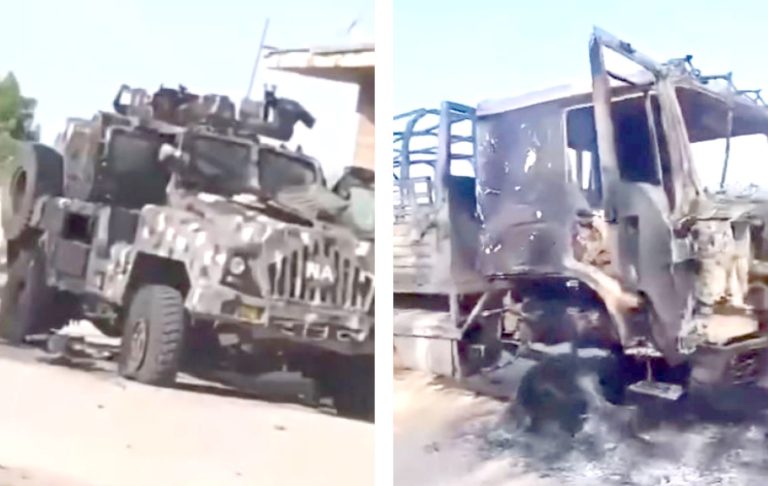Suspected Boko Haram insurgents have launched coordinated attacks on three military bases in Borno State—Rann, Gajiram, and Dikwa, killing at least four soldiers and leaving several others wounded.
Security and local sources confirmed that the attacks occurred in the early hours of Tuesday, barely 24 hours after a similar assault in Marte, where an unspecified number of soldiers were killed and many others remain missing.
In Rann, the insurgents stormed the military base around midnight, killing four soldiers and injuring six others. They also destroyed key military assets, including a Mine-Resistant Ambush Protected (MRAP) vehicle, a gun truck, and a Russian-made T-72 tank.
“We lost four soldiers while four sustained gunshot wounds. They also set ablaze MRAP, a gun truck and a Russian-made T-72,” a security source said.
A resident of the town told Daily Trust that the terrorists invaded the location around 12:00 a.m. and engaged troops in a prolonged firefight.
Read also: Nigeria military raids niger delta, arrests 36, destroys 21 illegal refineries
“The military retreated. They looted weapons including gun trucks before leaving the base. We saw the corpses of four soldiers and other injured soldiers. I’m not sure of their number,” he said.
According to him, the terrorists withdrew only after a fighter jet appeared over the base.
Rann, located in Kala-Balge Local Government Area near the Cameroon border, has a history of deadly attacks. In 2017, a Nigerian Air Force jet mistakenly bombed a refugee camp there, killing dozens of civilians. The area’s poor road network and persistent insecurity have hindered humanitarian and military access for years.
Meanwhile, in Gajiram, the headquarters of Nganzai Local Government Area, troops successfully repelled another attack. The terrorists were forced to retreat after more than an hour of intense fighting.
“The terrorists recorded heavy casualties and were forced to retreat during simultaneous attacks they coordinated in Rann, Gajiram and Dikwa,” a military source said.
He added: “The ISWAP attack on Gajiram is an indication that their target is to take over Monguno. They may be trying to isolate the town before launching a major attack. We are calling on the air force to be on high alert.”
Gajiram, about 82 kilometers from Maiduguri, has also seen frequent attacks in recent months.
Army vows to crush insurgents despite regional instability
The Army Public Relations Officer of Operation Hadin Kai, Capt. Reuben Kovangiya, confirmed the attacks and reassured the public of the military’s commitment to defeating terrorism.
“Yesterday alone, there were attacks in Rann, Dikwa and Gajiram. All these attacks were defeated apart from Rann where they succeeded in penetrating to an extent, leading to the loss of 4 personnel,” he said.
“Let me reassure you that the overall resolve of the Nigerian military is that we will completely defeat this terrorism and restore peace to the region once and for all, in the shortest possible time. We just need the support of the nation.”
Capt. Kovangiya noted that despite setbacks, progress has been made in restoring normalcy to the North East.
“The terrorists have been degraded. There is little doubt that normalcy has greatly returned to the North East region, compared to where it was five to ten years ago. In war, you have several campaigns which are series of coordinated operations aimed at achieving strategic objectives. So you will win some and lose some. What is most important is the statistics of what you win against what you lose,” he explained.
“In the last one week alone, over 20 terrorists have been neutralised and arms and ammunition recovered, even as we continue to conduct operations on multiple fronts as we speak. For now, most citizens have returned to their communities and socio-economic activities have returned.”
He cited Malam Fatori and Kukawa as recent success stories, where nearly 20,000 internally displaced persons (IDPs) have returned to their homes.
However, he acknowledged that instability in the wider Sahel region continues to fuel violence in Nigeria.
“These weapons find their way down into Nigeria, due to our large and porous borders, thereby reenergising the fight,” he added.








